新概念英语青少版3A_Unit_9_What's_in_a_name
新概念英语青少版3A课文掌中宝双面打印版
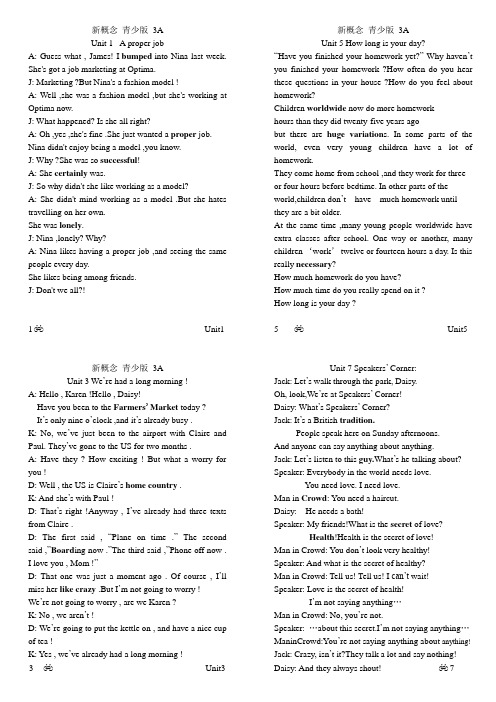
Unit 1 A proper jobA: Guess what , James! I bumped into Nina last week. She's got a job marketing at Optima.J: Marketing ?But Nina's a fashion model !A: Well ,she was a fashion model ,but she's working at Optima now.J: What happened? Is she all right?A: Oh ,yes ,she's fine .She just wanted a proper job. Nina didn't enjoy being a model ,you know.J: Why ?She was so successful!A: She certainly was.J: So why didn't she like working as a model?A: She didn't mind working as a model .But she hates travelling on her own.She was lonely.J: Nina ,lonely? Why?A: Nina likes having a proper job ,and seeing the same people every day.She likes being among friends.J: Don't we all?!1 ------------------------------------------------------ Unit1--------------------------------------------------------------------新概念青少版3AUnit 3 We’re had a long morning !A: Hello , Karen !Hello , Daisy!Have you been to the Farmers’ Market today ?It’s only nine o’clock ,and it’s already busy .K: No, we’ve just been to the airport with Claire and Paul. They’ve gone to the US for two months .A: Have they ? How exciting ! But what a worry for you !D: Well , the US is Claire’s home country .K: And she’s with Paul !D: That’s right !Anyway , I’ve already had three texts from Claire .D: The first said , “Plane on time .”The second said ,”Board ing now .”The third said ,”Phone off now .I love you , Mom !”D: That one was just a moment ago . Of course , I’ll miss her like crazy .But I’m not going to worry ! We’re not going to worry , are we Karen ?K: No , we aren’t !D: We’re going to put the kettle on , and have a nice cup of tea !K: Yes , we’ve already had a long morning !3--- --------------------------------------------------- Unit3Unit 5 How long is your day?“Have you finished your homework yet?” Why haven’t you finished your homework ?How often do you hear these questions in your house ?How do you feel about homework?Children worldwide now do more homeworkhours than they did twenty-five years ago-but there are huge variation s. In some parts of the world, even very young children have a lot of homework.They come home from school ,and they work for three or four hours before bedtime. In other parts of the world,children don’t have much homework until they are a bit older.At the same time ,many young people worldwide have extra classes after school. One way or another, many children ‘work’twelve or fourteen hours a day. Is this really necessary?How much homework do you have?How much time do you really spend on it ?How long is your day ?5----- ------------------------------------------------ Unit5--------------------------------------------------------------------Unit 7 Speakers’ Corner:Jack: Let’s walk through the park, Daisy.Oh, look,We’re at Speakers’ Corner!Daisy: What’s Speakers’ Corner?Jack: It’s a British tradition.People speak here on Sunday afternoons.And anyone can say anything about anything.Jack: Let’s listen to this guy.What’s he talking about? Speaker: Everybody in the world needs love.You need love. I need love.Man in Crowd: You need a haircut.Daisy: He needs a bath!Speaker: My friends!What is the secret of love?Health!Health is the secret of love!Man in Crowd: You don’t look very healthy! Speaker: And what is the secret of healthy?Man in Crowd: Tell us! Tell us! I can’t wait! Speaker: Love is the secret of health!I’m not saying anything…Man in Crowd: No, you’re not.Speaker: …about this secret.I’m not saying anything…ManinCrowd:You’re not saying anything about anything! Jack: Crazy, isn’t it?They talk a lot and say nothing! Daisy: And they always shout! -- 7--Unit 6 Bird-brainedK: Have you done your homework yet , Lucy?L: I’m just taking a break , Mum.I’ve found this really strange story on the eNews Website. Come and have a look.An eight-year-old peacock in Shropshire has fallen hopelessly in love with a petrol pump. Every day for the last three years , Mr.P., the peacock ,has made the three-hundred-metre journey along the main road from his home to the busy petrol pumps.The pumps make a clicking noise when someone is filling up. To Mr.P. , this sounds just like an admiring peahen.One pump in particular has won Mr.P.’s admiration. He has been faithful to this pump since he was five. Mr.P. has lost interest in the peahens at home . Clearly, they can’t compete with the glamorous petrol pump.6------ ---------------------------------------------- Unit6 --------------------------------------------------------------------Unit 8 Crazy about Alexander CalderAmy: Hi kid, come on in ! My! You look tired!C: Hi, Grandma! We fell fine. We’ve had a great day! Paul: Yes, it was amazing!Amy: Where did you go?Claire: We went to the American Art Museum.Paul fell in love with the sculpture s.We spent hours on the work of Alexander Calder. Paul: You liked it as well!Clair: Yes, I did!I loved his jewellery!Paul: They’re lovely things.They look very simple, but they’re not simple at all.C: The shapes are very strong, and the colours are soft…Paul: Anyway…His hanging sculptures were the best for me ! Paul: There was one huge one, called ‘Big Red’.It was made of triangular pieces, like feathers.The pieces were made of aluminium.They looked heavy, but they were light.Paul: We blew on one little disc, and the whole thing moved.Claire: Yeah, that was cool!All the pieces moved around, like a native Indian headdress. -- Unit8--Unit 2 Just like your mother~C: Oh, good! We’re in the front row, so we’ve got some extra space.P: That’s great, Claire .How did you know?C: Mom told me. We’re both tall, and it’s a long flight. P: Your mother’s brilliant! It’s great to stretch out. Flight Attendant: Would you lik e some water or some orange juice?Claire: Not now, thanks. I’ve just had a drink.Paul: I’d li ke some water, please.Flight Attendant: Have you had a magazine ora newspaper?P: No, we haven’t. I’d like this one, please.Ah, I’m going to enjoy this flight!Flight Attendant: Excuse me. Would you mind giving your seats to this couple?They’re both very tall, and they need the extra space. C: They are tall. Why don’t you put them in Business Class?P: Claire! You sound just like your mother!2-- --------------------------------------------------- Unit2 --------------------------------------------------------------------Unit 4 A museum pieceR: What’s this, Dad?W: It’s an Apple 2.It’s a very early computer.In fact, it’s the first Personal Computer, ever.It came onto the market in 1977.Where did you find it?R: Mum found it in a box in the attic.W: Oh, then it’s mine!It’s been there for years.In fact, it’s been there since we moved into this R: Does it still work?W: I don’t know……Ah, there you are!Can you hear the hard disk?R: Is that noise the hard disk?It sounds like a lawnmower!W: It hasn’t been out of its box for twenty years!R: What can you do with it?W: Good question! It’s just a museum piece, really. It’s only got five Megabyte s’ hard disk space.R: Five Megabytes! That’s nothing!W: I know.It was already a museum piece when I bought it, and that was a long time to go.Maybe I’m a museum piece now, too!4---- --------------------------------------------- Unit4Unit 9 What’s in a name?Picture this! Someone offers you a cup of something, and says, ‘try this!’You’re never seen this liquid before, and you don’t recognize it. Do you drink it straight away? I don’t think so! Do you taste it immediately? Probably not. Before you put the cup of your lip s, you probably ask,‘What is it?’or, ‘What does it taste like?’Now, imagine a reply like this:‘Actually, it’s a solution of organic chemicals and inorganic salt s.’Would you taste the drink now?Of course not!‘I always avoid chemicals in food and drink,’you’d say.‘I never touch anything unnatural!’Quite right! We’d all say the same thing.Names are very powerful. But just think! We eat and drink ‘chemicals’all the time. Even pure water is a chemical. It’s made of hydrogen and oxygen.Let’s go back to the liquid in your cup. Taste is! It’s good for you!‘Mmm, it tastes good! Mmm! Please can I have another cup? What is it?’Well, funnily enough, by another name, it’s just ‘a cup of tea’.9----------- --获取更多资源请关注:率哥----- Unit9--------------------------------------------------------------------Unit 11 Turn it down!L:Dad, that music’s loud!Turn it down!W:Sorry,Lucy!Am I interrupt ing your homework?L:It’s not that,Dad.We had a lesson today about hearing.Look at this. One person in seven in the UK is deaf, and many of them are deaf because of noise.For most people,the safe limit is 85 decibel s(dB) for continuous noise,and 103 dB for sudden noise.After fifteen minutes at 105 dB,most people will have some damage to their hearing.Music in nightclub s is often much louder than the safe limit.19% of young people listen to their MP3 players at 105 to 110 dB for many hours.75% of them will experience‘ringing in the ears’,and they will feel a bit deaf.If they are lucky,this will last for one or two days. If they are unlucky, the damage will last for ever.L:You’re always listening to loud music,Dad.If you aren’t careful,you’ll become deaf.W:Sorry,Lucy!What did you say?L:Oh,Dad!It isn’t. And I will turn the sound down.I promise!11----------- --------------------------------------- Unit11UNIT 13 What am I doing here?K:Here at las t!How do you like Redstone Ranch, Jed?J:It looks nice!I’m looking forward to a swim.K:Good idea!But let me tell you the rule s first.J:Rules?I’m on vacation!K:There are some rules,honey. J:Such as?K:Shoes.You can’t use heavy equipment in the gyms without the right shoes.J:I’m not going to use heavy equipment.K:And if you go to a dance class,you can’t wearblack-soled trainers.Black-soled trainers mark the floors.J:When am I going to go to a dance class? K:And you must wear a T-shirt or vest at all times. You’re not allowed to show your chest.J:Not even when I’m swimming?K:It’s OK when you’re swimming…K:When you’re in the wet zones,you can wear a swimsuit and you can show your chest.J:What else is not allowed?K:We’re not allowed to run or shout in public areas. J:Kelly,believe me!I have enough rules at work!What am I doing here?K:I just want us to have a nice holiday! --- Unit13----------------------------------------------------------------UNIT 15 Not on a school night!L:Mum, I’m going to the cinema tomorrow.Do you mind if I stop over at Flora’s house afterwards?K:Yes,I do mind! I want you to be back here by 9.30 at the latest.L:9.30!The film doesn’t finish till 10!I won’t be able to go!Can’t you or Dad pick me up outside the cinema? Please!K:No,I’m sorry,Lucy. Not on a school night.L:But Mum!Everybody’s going!K:I’ll be surprised if everyone is going.You’ve got school next day.9.30 is late enough. L:Oh, Mum! K:Look,Lucy! You have a lot of freedom.Your father and I work all day,and we pick you up,late at night,a couple of times a week. That’s fine at weekends,but not during the week.K:As far as I’m concerned,you may not stay out later than 9.30 on a school night.L:Flora’s mother lets her go out.K:And we let you go out-but not on a school night!K:I’ll be surprised if Flora stays out late in the week.You may go to the cinema on Friday.And I’ll pick you up outside the cinema at o’clock.15----------------------------------------------- Unit15UNIT 14 The wrong 12-year-old!R:Did you hear about Jake Oliver,Dad?W:Jake Oliver?R:you know .He’s the world karate champion.He came first in his age-group last year.W:Oh,yes.He’s only 12,isn’t he?R:That’s right. He lives in Bristol.He was on his way home from a practice session last week,and a tall guy with a hood grab bed him. This guy wanted him to hand over his mobile phone.R:Jake said to himself, ‘I earned this phone! I worked really hard to be able to buy it!’W:Obviously, he wouldn’t want a thief to take it like that!R:Right! R:So the guy tried to punch him.Jake step ped sideways,and gave him one in the face.It broke the guy’s nose.There was blood everywhere. The thief held his nose and ran!W:He picked the wrong 12-year-old!What a great story! R:Yeah,well,Dad.I want to learn karate now.W:I can understand that, Robert.But I don’t want you to get into fight s. What will your mother say?R:That’s the question,Dad.I’d like you to ask her.14----------------------------------------- --------Unit14 -------------------------------------------------------------------- 封底装订说明:A4纸双面打印后每页分别短边对短边,长边对长边,对折出十字线,裁切为4份,共15个单元(30课时),请按单元数字1~15调整好顺序,第五页为封面和备忘录,短边对折裁切为上下两部分,长边对折压出中线折痕,放入裁切好的前4页,在左侧装订即可。
青少版新概念入门级AUnit9教案(大全5篇)

青少版新概念入门级AUnit9教案(大全5篇)第一篇:青少版新概念入门级AUnit9教案Unit 9 What's this,Mum? λ发音:掌握字母o在单词中的基本发音:o /ɔ/如:orange fox box not mop hot hop λ重点词汇:bone hamburger salad sausage tomato pizza λ新课标词汇:hamburger salad tomato λ课文重点:1)、What's this/that?学生会用这个句型来提问,并且会用It's...来回答。
2)、What is it? It's...。
学生会用运用句型提问,并且能够用It's...来回答。
3)、日常口语:Let's play!我们一起玩吧!Your turn!到你了!λ重点语法:What's this/that?What's=what is 要求学生会将缩写与全写相互替换着写出来。
this所指物体离说话者距离近:这,这个;that所指物体离说话者距离远:那,那个(this,that都只能表示一个)教案: Period 1:Step1:Greetings and divide groups4mins Step2:warm-up(happy happy together)5mins Step3:review the words in the previous class(point and say)5mins Step4: presentation lead in the words by showing a food party and ask what do you like?Bonedrill : pass the picture and say4minsHamburgerdrill:jump and say5minsSaladdrill: write and say4minsSausagedrill: high and low voice5minsTomatodrill: fingers-play game5minsPizzadrill: catch and say4mins Step5: review the wordsdrill: play blue and red markers6minsPeriod 2: Step1: warm-up(red light and green light and yellow light)4mins Step2:review the content in the previous classdrill: jump and say 5mins Step3: presentation 听录音,引入课文内容16minsDrill: 1)speaking practice2)pair work3)speaking performanceStep4:引入What's this/that? 让学生用这个句型来提问,并且会用It's...来回答。
青少版新概念3A-unit-9

It is made of triangular pieces.
5、它们看起来很沉,实际上很轻。
They looked heavy, but they were light.
New Words and Expressions
picture /'pɪktʃə/ v.想象,设想 liquid /'lɪkwɪd/ n.液体 recognize /'rekəɡnaɪz/ v.辨认出 immediately /ɪ'mi:diətli/ adv.立即,马上 lip /lɪp/ n.嘴唇 imagine /ɪ'mædʒɪn/ v.想象 reply /rɪ'plaɪ/ n.回答,回复 solution /səˈlu:ʃən/ n.溶液
New Words and Expressions
organic /ɔ:ˈgænɪk/ adj.有机物的 inorganic /ˌɪnɔ:ˈgænɪk/ adj.无机的 salt /sɔ:lt/ n.盐 avoid /ə'vɔɪd/ v.避免 unnatural /ʌnˈnætʃrəl/ adj.非天然的 hydrogen /ˈhaɪdrədʒən/ n.氢 oxygen /'ɒksɪdʒən/ n.氧 common /'kɒmən/ adj.普遍的,常见的 grow /ɡrəʊ/ v.种植
新概念英语青少版3A-Unit-9-What's-in-a-name

New words and expressions
milk n. 丝,丝绸 mix v. 混合 stir v. 搅拌 pour v. 倒,灌 heat v. 加热 boil v. 煮沸 fry v. 油炸 grill v. 烧,烤 bake v. 烘,烤
gossip solution lip common reply boil oxygen
Notes on the Text
recognize,vt.认出;识别;承认 vi.承认,确认;赏识
e.g: I recognize my own shortcomings... e.g: ...a nationally recognized expert on psychology. e.g: He had the insight to recognize their talents...
茶的利用始作药料,在《神农本草经》一书中曾经指出:“神农 尝百草,日遇七十二毒,得荼而解之”(注:茶原名荼),说是 远在公元前2737-2697年茶被神农所发现,并用为药料,自此 后,茶逐渐推广为药用。但何时开始作为饮料,史料极缺,只 有公元前59年的王褒《僮约》一文,曾提到“武阳买茶”“烹
茶尽 具”等工作内容,这是茶用来饮用的最早记载。
Unit 9 What's in a name?
Revision:
1.我们在交通上的花费很少。 We spend little on transportation.
2. 我们应该多花点时间读书。 We should spend more time in reading.
感觉很好 度过美好的一天 爱上雕塑 它们一点都不简单。 它们的形状很强壮,颜色很柔和。
有一年冬天,快过年时分,雪下得很大,茶树也将冻死,采 办年货的行人络绎不绝,依旧在老太太家门口歇脚,其中有 一长者见老太愁容不展,就问:“老太太年货采办了没有? ”老太太长吁短叹地说:“别说年货无钱采办,就是这些茶 树也快冻死,明年春天施茶也就不成了。”长者指着边上一 个破石臼说:“宝贝就在这里,有何为,不如将此石臼卖于 我好么?”老太太说:“这石臼越旧越好,如今洗了就不值 钱了。”老太太说:“破臼本不值钱,你要只顾取去。”
青少版新概念3A unit 9 课件PPT(共28页)

长者掏出10两银子将石臼搬去,老太太本 不肯收钱,无奈长者转身已不知去向, 老太太只得将钱收下。
过了年,第二年春天,18棵茶树嫩牙新发, 长得比往年好,并且洗臼泼水的地方 又长出无数棵茶树,老太太又欢天喜地的 施起茶来。
这就是龙井茶叶的来历。
New words and expressions
picture v. 想象,设想 liquid n. 液体 recognize v. 辨认出 immediately adv. 立即,马上 lip n. 嘴唇 Imagine v. 想象 reply n. 回答,答复 solution n. 溶液 organic adj. 有机物的 inorganic adj. 无机的
Notes on the Text
I don’t think so!——在think, believe, be afraid, hope等词后,要用so,而不用it。在否 定句中,也可以用not 代替not...so。
因此,此举也可以表述为:I think not。
Probably not——由于此句中的主语和谓语动词 与前一句的主谓相同,所以省略了该句的主谓成 分。
e.g: The paper is made from wood. 纸是木头做的。
3.be made in, 产自... e.g: The car is made in China.
go back to, 回去;归
Let’s go back to the liquid in your cup. Taste it! It’s good for you!
Unit 9 What's in a name?
Revision:
1.我们在交通上的花费很少。 We spend little on transportation.
新概念英语青少版入门级Aunit9教案
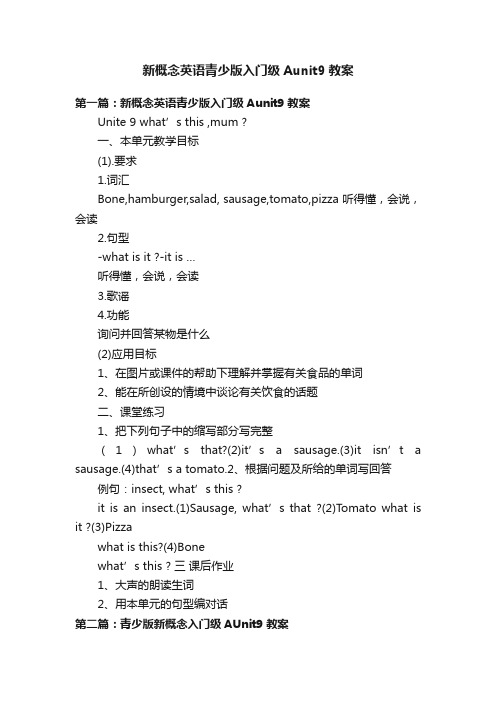
新概念英语青少版入门级Aunit9教案第一篇:新概念英语青少版入门级Aunit9教案Unite 9 what’s this ,mum ?一、本单元教学目标(1).要求1.词汇Bone,hamburger,salad, sausage,tomato,pizza 听得懂,会说,会读2.句型-what is it ?-it is …听得懂,会说,会读3.歌谣4.功能询问并回答某物是什么(2)应用目标1、在图片或课件的帮助下理解并掌握有关食品的单词2、能在所创设的情境中谈论有关饮食的话题二、课堂练习1、把下列句子中的缩写部分写完整(1)what’s that?(2)it’s a sausage.(3)it isn’t a sausage.(4)that’s a tomato.2、根据问题及所给的单词写回答例句:insect, what’s this ?it is an insect.(1)Sausage, what’s that ?(2)Tomato what is it ?(3)Pizzawhat is this?(4)Bonewhat’s this ? 三课后作业1、大声的朗读生词2、用本单元的句型编对话第二篇:青少版新概念入门级AUnit9教案Unit 9 What's this,Mum? λ发音:掌握字母o在单词中的基本发音:o /ɔ/如:orange fox box not mop hot hop λ重点词汇:bone hamburger salad sausage tomato pizza λ新课标词汇:hamburger salad tomato λ课文重点:1)、What's this/that?学生会用这个句型来提问,并且会用It's...来回答。
2)、What is it? It's...。
学生会用运用句型提问,并且能够用It's...来回答。
新概念青少版3A教师
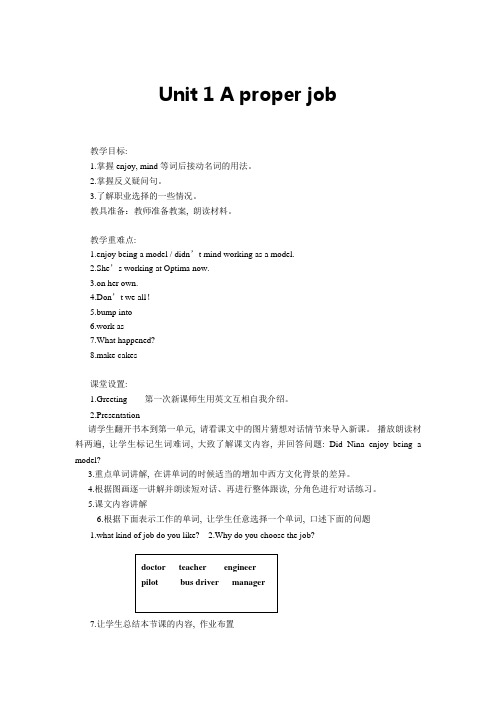
Unit 1 A proper job教学目标:1.掌握enjoy, mind等词后接动名词的用法。
2.掌握反义疑问句。
3.了解职业选择的一些情况。
教具准备:教师准备教案, 朗读材料。
教学重难点:1.enjoy being a model / didn’t mind working as a model.2.She’s working at Optima now.3.on her own.4.Don’t we all!5.bump into6.work as7.What happened?8.make cakes课堂设置:1.Greeting 第一次新课师生用英文互相自我介绍。
2.Presentation请学生翻开书本到第一单元, 请看课文中的图片猜想对话情节来导入新课。
播放朗读材料两遍, 让学生标记生词难词, 大致了解课文内容, 并回答问题: Did Nina enjoy being a model?3.重点单词讲解, 在讲单词的时候适当的增加中西方文化背景的差异。
4.根据图画逐一讲解并朗读短对话、再进行整体跟读, 分角色进行对话练习。
5.课文内容讲解6.根据下面表示工作的单词, 让学生任意选择一个单词, 口述下面的问题1.what kind of job do you like?2.Why do you choose the job?7.让学生总结本节课的内容, 作业布置Unit 2 Just like your mother!教学目标:1掌握动词不定式后置的用法。
2初步了解现在完成时态。
3学会礼貌用语。
教具准备: 教师准备教案, 朗读材料。
教学重难点:1.It’s great to stretch out.2.I’ve just had a drink.3.Would you like…? Would you mind…?4.Sound like5.In the front row6.Business class课堂设置:1.Greeting 回顾第一单元内容, 检查练习册完成情况。
青少版新概念入门级A_unit9
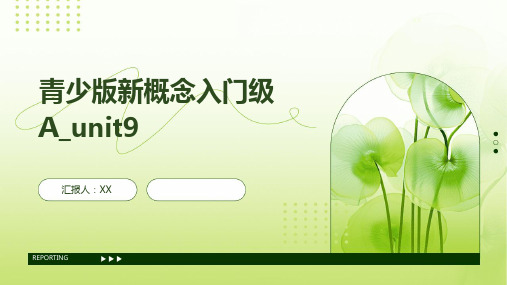
2. 听录音,判断下列句子是否 正确。
3. 听录音,填写表格中的缺失 信息。
听力原文与答案解析
1. 【听力原文】 W: What's your favorite sport?
M: I like playing football best.
听力原文与答案解析
• 【答案解析】正确答案为“足球”的图片。听力 材料中男性说“我最喜欢踢足球”,因此应选择 足球的图片。
正在学习。)
分析句型的结构和用法,理解其 含义和用法。
进行句型转换练习,如将陈述句 转换为疑问句或否定句等,以加
深对句型结构的理解和掌握。
XX
PART 07
自测与评估
REPORTING
自测题目及答案解析
自测题目1
请翻译以下句子——"我喜欢在周 末和家人一起做饭。"
答案解析
正确翻译为"I enjoy cooking with my family on weekends."。注意 时态和固定搭配的使用。
听力原文与答案解析
2. 【听力原文】
W: When do you usually get up on weekends? M: I usually get up at 8 o'clock.
听力原文与答案解析
• 【答案解析】正确答案为“正确”。听力材料中女性问“你周末通常几点起床?”,男性回答“我通常8点钟起床。”,因 此句子“我周末通常8点钟起床。”是正确的。
自我介绍
介绍自己的姓名、 年龄、兴趣爱好等 。
谈论学校生活
介绍自己的学校、 老师、同学以及学 校生活等。
谈论旅游经历
介绍自己曾经去过 的地方、旅游经历 以及感受等。
青少版新概念入门级AUnit9教案

青少版新概念入门级AUnit9教案Unit 9 What's this,Mum?, 发音:掌握字母o在单词中的基本发音:o /?/如:orange fox box not mop hot hop, 重点词汇:bone hamburger salad sausage tomato pizza , 新课标词汇:hamburger salad tomato, 课文重点:1)、What's this/that?学生会用这个句型来提问,并且会用It's ...来回答。
2)、What is it, It's ...。
学生会用运用句型提问,并且能够用It's ...来回答。
3)、日常口语:Let's play~我们一起玩吧~Your turn!到你了~, 重点语法:What's this/that?What's=what is 要求学生会将缩写与全写相互替换着写出来。
this所指物体离说话者距离近:这,这个;that所指物体离说话者距离远:那,那个(this,that都只能表示一个)教案:Period 1:Step1:Greetings and divide groups 4mins Step2:warm-up (happy happy together) 5mins Step3:review the words in the previous class ( point andsay) 5mins Step4: presentation lead in the words by showing a food party and ask what do you like?Bone drill : pass the picture and say 4minsHamburger drill: jump and say 5minsSalad drill: write and say 4minsSausage drill: high and low voice 5minsTomato drill: fingers-play game 5minsPizza drill: catch and say 4mins Step5: review the words drill: play blue and red markers 6minsPeriod 2:Step1: warm-up (red light and green light and yellow light) 4mins Step2:review the content in the previous class drill: jump and say 5mins Step3: presentation 听录音,引入课文内容 16minsDrill: 1)speaking practice2) pair work3) speaking performanceStep4:引入What's this/that? 让学生用这个句型来提问,并且会用It's ...来回答。
新概念英语青少版入门级Aunit9教案
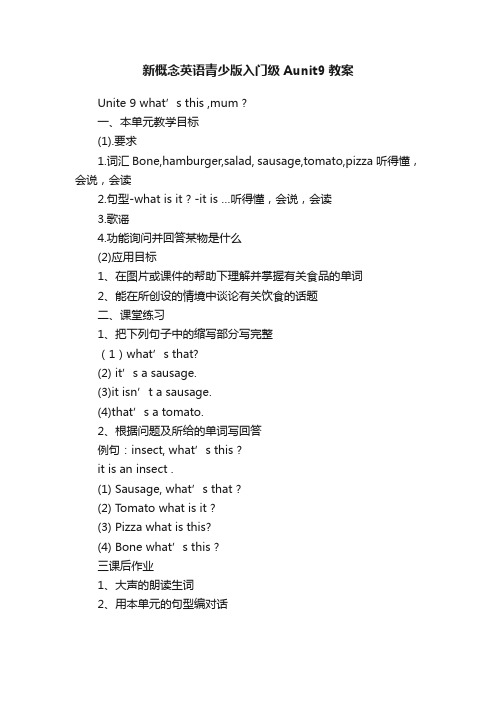
新概念英语青少版入门级Aunit9教案
Unite 9 what’s this ,mum ?
一、本单元教学目标
(1).要求
1.词汇Bone,hamburger,salad, sausage,tomato,pizza 听得懂,会说,会读
2.句型-what is it ? -it is …听得懂,会说,会读
3.歌谣
4.功能询问并回答某物是什么
(2)应用目标
1、在图片或课件的帮助下理解并掌握有关食品的单词
2、能在所创设的情境中谈论有关饮食的话题
二、课堂练习
1、把下列句子中的缩写部分写完整
(1)what’s that?
(2) it’s a sausage.
(3)it isn’t a sausage.
(4)that’s a tomato.
2、根据问题及所给的单词写回答
例句:insect, what’s this ?
it is an insect .
(1) Sausage, what’s that ?
(2) Tomato what is it ?
(3) Pizza what is this?
(4) Bone what’s this ?
三课后作业
1、大声的朗读生词
2、用本单元的句型编对话。
青少版新概念3A课文
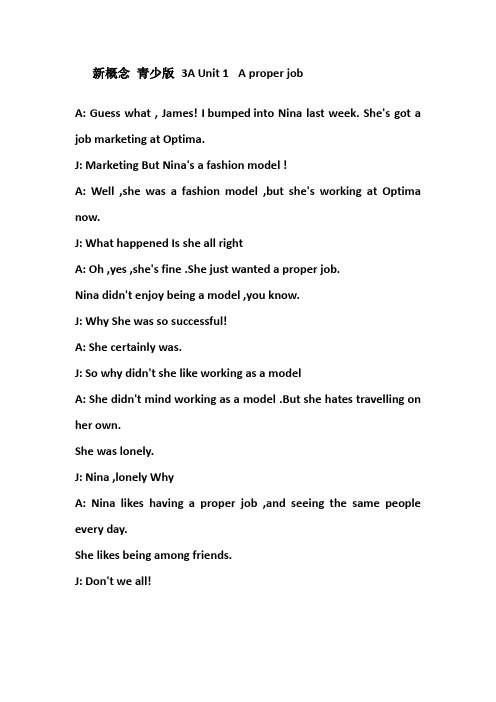
新概念青少版3A Unit 1 A proper jobA: Guess what , James! I bumped into Nina last week. She's got a job marketing at Optima.J: Marketing But Nina's a fashion model !A: Well ,she was a fashion model ,but she's working at Optima now.J: What happened Is she all rightA: Oh ,yes ,she's fine .She just wanted a proper job.Nina didn't enjoy being a model ,you know.J: Why She was so successful!A: She certainly was.J: So why didn't she like working as a modelA: She didn't mind working as a model .But she hates travelling on her own.She was lonely.J: Nina ,lonely WhyA: Nina likes having a proper job ,and seeing the same people every day.She likes being among friends.J: Don't we all!新概念青少版3A Unit 2 Just like your mother~C: Oh, good!We’re in the front row, so we’ve got some extra space.P: That’s great, Claire .How did you knowC: Mom told me. We’re both tall, and it’s a long flight.P: Your mother’s brilliant! It’s great to stretch out.FlightAttendant: Would you like some water or some orange juice Claire: Not now, thanks. I’ve just had a drink.Paul: I’d like some water, please.FlightAttendant: Have you had a magazine or a newspaperP: No, we haven’t. I’d like this one, please.Ah, I’m going to enjoy this flight!FlightAttendant: Excuse me. Would you mind giving your seats to this coupleThey’re both very tall, and they need the extra space.C: They are tall. Why don’t you put them in Business ClassP: Claire! You sound just like your mother!新概念青少版3A Unit 3 We’re had a long morning !A: Hello , Karen !Hello , Daisy!Have you been to the Farmers’ Market todayIt’s only nine o’clock ,and it’s already busy .K: No, we’ve just been to the airport with Claire and Paul They’ve gone to the US for two months .A: Have they How exciting ! But what a worry for you !D: Well , the US is Claire’s home country .K: And she’s with Paul !D: That’s right !Anyway , I’ve already had three texts from Claire .D: The first said , “Plane on time .”The second said ,”Boarding now .”The third said ,”Phone off now . I love you , Mom !”D: That one was just a moment ago . Of course , I’ll miss her like crazy .But I’m not going to worry !We’re not going to worry , are we KarenK: No , we aren’t !D: We’re going to put the kettle on , and have a nice cup of tea ! K: Yes , we’ve already had a long morning !新概念青少版3A Unit 4 A museum pieceRobert: What’s this, DadWilliam: It’s an Apple 2.It’s a very early computer.In fact, it’s the first Personal Computer, ever.It came onto the market in 1977.Where did you find itRobert: Mum found it in a box in the attic.William: Oh, then it’s mine!It’s been there for years.In fact, it’s been there since we moved into this house! Robert: Does it still workWilliam: I don’t know……Ah, there you are!Can you hear the hard diskRobert: Is that noise the hard disk、It sounds like a lawnmower!William: It hasn’t been out of its box for twenty years!Robert: What can you do with itWilliam: Good question!It’s just a museum piece, really.It’s only got five Megabytes’ hard disk space.Robert: Five Megabytes!That’s nothing!William: I know.It was already a museum piece when I bought it,and that was a long time to go.Maybe I’m a museum piece now, too!新概念青少版3A Unit 5“Have you finished your homework yet” Why haven’t you finished your homework How often do you hear these questions in your house How do you feel about homeworkChildren wordwide now do more homeworkhours than they did twenty-five years ago-but there are huge variations. In some partsof the world, even very young childrenhave a lot of homework.They come home from school ,and theywork for three or four hours beforebedtime. In other parts of the world,children don’t have much homework untilthey are a bit older.At the same time ,many young peopleworldwide have extra classes after school. One way or another, many children ‘work’twelve or fourteen hoursa day. Is this really necessaryHow much homework do you haveHow much time do you really spend on itHow long is your day新概念青少版3A Unit 6 Bird-brainedK: Have you done your homework yet , LucyL: I’m just taking a break , Mum.I’ve found this really strange story on the eNews Website. Come and have a look.An eight-year-old peacock in Shropshire has fallen hopelessly in love with a petrol pump. Every day for the last three years , ., the peacock ,has made the three-hundred-metre journey along the main road from his home to the busy petrol pumps make a clicking noise when someone is filling up. To . , this soundsjust like an admiring peahen.One pump in particular has won .’s admiration. He has been faithful to this pump since he was five. . has lost interest in the peahens at home . Clearly, they can’t compete with the glamorous petrol pump.新概念青少版3A Unit 7Speakers’ Corner:Jack: Let’s walk through the park, Daisy.Oh, look,We’re at Speakers’ Corner!Daisy: What’s Speakers’ CornerJack: It’s a British tradition.People speak here on Sunday afternoons.And anyone can say anything about anything.Jack: Let’s listen to this guy.What’s he talking aboutSpeaker: Everybody in the world needs love.You need love. I need love.Man in Crowd: You need a haircut.Daisy: He needs a bath!Speaker: My friends!What is the secret of loveHealth!Health is the secret of love!Man in Crowd: You don’t look very healthy!Speaker: And what is the secret of healthyMan in Crowd: Tell us! Tell us! I can’t wait!Speaker: Love is the secret of health!I’m not saying anything……Man in Crowd: No, you’re not.Speaker: ……about this secret.I’m not saying anything……Man in Crowd: You’re not saying anything about anything! Jack: Crazy, isn’t itThey talk a lot and say nothing!Daisy: And they always shout!新概念青少版3A Unit 8Crazy about Alexander CalderAmy: Hi kid, come on in ! My! You look tired!Claire: Hi, Grandma! We fell fine. We’ve had a great day! Paul: Yes, it was amazing!Amy: Where did you goClaire: We went to the American Art Museum.Paul fell in love with the sculptures.We spent hours on the work of Alexander Calder.Paul: You liked it as well!Clair: Yes, I did!I loved his jewellery!Paul: They’re lovely things.They look very simple, but they’re not simple at all.Claire: The shapes are very strong, and the colours are soft…Paul: Anyway…His hanging sculptures were the best for me !Paul: There was one huge one, called ‘Big Red’.It was made of triangular pieces, like feathers.The pieces were made of aluminium.They looked heavy, but they were light.Paul: We blew on one little disc, and the whole thing moved. Claire: Yeah, that was cool!All the pieces moved around, like a native Indianheaddress.新概念青少版3A Unit 9What’s in a namePicture this! Someone offers you a cup of something, and says, ‘try this’You’re never seen this liquid before, and you don’t recognize it. Do you drink it straight away I don’t think so! Do you taste it immediately Probably not.Before you put the cup of your lips, you probably ask,‘What is it’or, ‘What does it taste like’Now, imagine a reply like this:‘Actually, it’s a solution of organic chemicals and inorganic salts.’Would you taste the drink now Of course not!‘I always avoid chemicals in food and drink,’you’d say.‘I never touch anything unnatural!’Quite right! We’d all say the same thing.Names are very powerful. But just think! We eat and drink ‘chemicals’all the time. Even pure water is a chemical. It’s made of hydrogen and oxygen.Let’s go back to the liquid in your cup. Taste is! It’s good for you!‘Mmm, it tastes good! Mmm! Please can I have another cupWhat is it’Well, funnily enough, by another name, it’s just ‘a cup of tea’.新概念青少版3A Unit 10Trick of the tradePat: Gosh, Nina, you look good!Is that another new sweaterNina: You’ve seen it before.But I’ve turned it round, so the buttons go down the back. Pat: That’s clever!Nina: But it’s so simple!It’s easy enough for anyone to do this kind of thing.Pat: Not me!I’d love to be able to dress well.I try hard, but I just can’t look fashionable.Nina: It’s not about fashion!You just need to enjoy your clothes.Pat: It’s easy for you!You’re pretty enough to wear anything.You’d look great in a black plastic bag!Nina: Honestly, Pat, it’s about style, not fashion.Nina: Style is about wearing theright shapes and colours for you.For example, I never wear white next to my face.White is too cold for me to wear.Cream’s a better colour for me.Pat: How do you know thatNina: Oh, these are tricks of the trade.Would you like me to touch youPat: Would I I’d love you to!新概念青少版3A Unit 11新概念青少版3A Unit 12新概念青少版3A Unit 13新概念青少版3A Unit 14新概念青少版3A Unit 15Turn it down!Lesson 21L:Dad, that music’s loud!Turn it down!W:Sorry,Lucy!Am I interrupting your homeworkL:It’s not that,Dad.We had a lesson today about hearing.Look at this.L:You’re always listening to loud music,Dad.If you aren’t careful,you’ll become deaf.W:Sorry,Lucy!What did you sayL:Oh,Dad!It isn’t.And I will turn the sound down.I promise!One person in seven in the UK is deaf, and many of them are deaf because of noise.For most people,the safe limit is 85 decibels(dB) for continuous noise,and 103 dB for sudden fifteen minutes at 105 dB,most people will have some damage to their hearing.Music in nightclubs is often much louder than the safe % of young people listen to their MP3 players at 105 to 110 dB for many % of them will experience ‘ringing in the ears’,and they will feel a bit they are lucky,this will last for one or two days. If they are unlucky, the damage will last for ever.UNIT 12 Paul becomes an internLesson 23E:Paul,you want to join our intern program form next that rightP:Yes, that’s right.E:What are your plans between now and thenP:I’m going to travel out west,to Utath and Arizona.E:Will you apply for other intern programs when you’re out thereP:that’s my plan.E:I see. We are the market leader,of course.P:I know that.E:And you’re an exceptional applicant.E:I’m going to make you an offer, Paul ,and you’re going to tell me yes or no.You can join our intern program form Monday next week,for twelve weeks.E:If you join,you’ll, you’ll live on the Ranch,and you’ll have no expenses. When we ask you to work, you’ll work.You’ll learn a lot.E:Maybe you’ll come back in January,maybe you won’t. Either way,when you finish here,you’ll have Redstone Ranch on your resune.E:What do you sayP: you very much.E:You won’t regret it!UNIT 13 What am I doing hereLesson 25K:Here at last!How do you like Redstone Ranch, JedJ:It looks nice!I’m looking forward to a swim.K:Good idea!But let me tell you the rules first.J:RulesI’m on vacation!K:There are some rules,honey.J:Such asK: can’t use heavy equipment in the gyms without the right shoes.J:I’m not going to use heavy equipment.K:And if you go to a dance class,you can’t wear black-soled trainers. Black-soled trainers mark the floors.J:When am I going to go to a dance classK:And you must wear a T-shirt or vest at all times. You’ re not allowed to show your chest.J:Not even when I’m swimmingK:It’s OK when you’re swimming…K:When you’re in the wet aones,you can wear a swimsuit and you can show your chest.J:What else is not allowedK:We’re not allowed to run or shout in public areas.J:Kelly,believe me!I have enough rules at work!What am I doing hereK:I just want us to have a nice holiday!UNIT 14 The wrong 12-year-oly!Lesson 27R:Did you hear about Jake Oliver,DadW:Jake OliverR:you know .He’s the world karate champion.He came first in his age-group last year.W:Oh,’s only 12,isn’t heR:That’s right. He lives in was on his way home from a practice session last week,and a tall guy with a hood grabbed him. This guy wanted him to hand over his mobile phone.R:Jake said to himself, ‘I earned this phone! I worked really hard to be able to buy it!’W:Obviously, he wouldn’t want a thief to take it likethat!R:Right!R:So the guy tried to punch stepped sideways,and gave him one in the broke the guy’s was blood everywhere. The thief held his nose and ran!W:He picked the wrong 12-year-old!What a great story!R:Yeah,well, want to learn karate now.W:I can understand that, I don’t want you to get into gights. What will your mother sayR:That’s the question,’d like you to ask her.UNIT 15 Not on a school night!Lesson 29L:Mum, I’m going to the cinema you mind if I stop over at Flora’s house afterwardsK:Yes,I do mind! I want you to bebck here by 9:30 at the latest.L:9:30!The film doesn’t finish till10!I won’t be able to go!Can’t you or Dad pick me up outside the cinemaPlease!K:No,I’m sorry,Lucy. Not on a school night.L:But Mum!Everybody’s going!K:I’ll be surprised if everyone is ’ve got school next is late enough.L:Oh, Mum!K:Look,Lucy! You have a lot of father and I work all day,and we pick you up,late at night,a couple of times a week. That’s fine at weekends,but not during the week.K:As far as I’m concerned,you may not stay out later than on a school night.L:Flora’s mother lets her go out.K:And we let you go out-but not on a school night!K:I’ll be surprised if Flora stays out late in the may go to the cinema on Friday.And I’ll pick you up outside the cinema at o’clock.。
PPT青少版新概念3A-U9课件
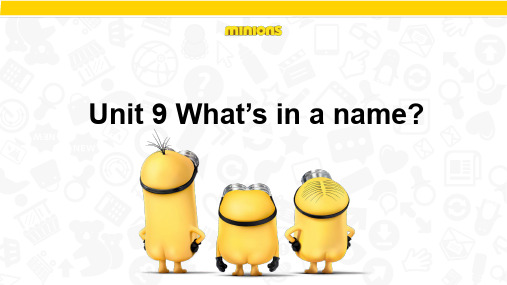
right now in a second immediately
right off in a moment
probably
adv. 大概; 或许; 很可能
You’re probably right. 你很可能是对的。
We will probably never meet again. 我们可能再也见不到面了。
recognize 认出, 识别
My friend recognized me by the way I walk. 我的朋友根据我走路的方式认出了我。
face recognition 面部识别
fingerprint recognition 指纹识别
立刻; 马上
right away
in a minute
暴风雪 汽车 电脑 力量
make China powerful and strong 振兴中华
pure
pure gold 纯金
pure wool 纯羊毛
纯的; 纯粹的; 纯洁的; 清白的
pure heart 纯洁的心灵
pure love 纯真的爱
pure metal 纯金属
nature 自然 natural 自然的 naturally 自然地 I’ve got naturally curly hair. 我天生卷发。 His eyes were unnaturally bright. 他的眼睛异常明亮。
power
力量, 能力; 电力, 功率, 性能; 政权, 势力
powerful 强大的; 强有力的 + snow storm/ car/ computer/ force/…
化碳、二氧化碳、碳酸、碳酸盐、碳化物、碳硼烷、烷基金属、 羰基金属、金属的有机配体配合物等在无机化学中研究的含碳 物种的集合。
- 1、下载文档前请自行甄别文档内容的完整性,平台不提供额外的编辑、内容补充、找答案等附加服务。
- 2、"仅部分预览"的文档,不可在线预览部分如存在完整性等问题,可反馈申请退款(可完整预览的文档不适用该条件!)。
- 3、如文档侵犯您的权益,请联系客服反馈,我们会尽快为您处理(人工客服工作时间:9:00-18:30)。
Names are very powerful. But just think! We eat and drink ‘chemicals’ all the time. Even pure water is a chemical. It’s made of hydrogen and oxygen.
Notes on the Text
Unit 9 What's in a name?
Revision:
1.我们在交通上的花费很少。
We spend little on transportation. 2. 我们应该多花点时间读书。
We should spend more time in reading.
感觉很好 度过美好的一天 爱上雕塑 它们一点都不简单。 它们的形状很强壮,颜色很柔和。
Notes on the Text
I don’t think so!——在think, believe, be afraid, hope等词后,要用so,而不用it。在否 定句中,也可以用not 代替not...so。 因此,此丼也可以表述为:I think not。 Probably not——由于此句中的主语和谓语动词 与前一句的主谓相同,所以省略了该句的主谓成 分。
茶的利用始作药料,在《神农本草经》一书中曾经指出:“神农 尝百草,日遇七十二毒,得荼而解乊”(注:茶原名荼),说是 远在公元前2737-2697年茶被神农所发现,并用为药料,自此 后,茶逐渐推广为药用。但何时开始作为饮料,史料极缺,只 有公元前59年的王褒《僮约》一文,曾提到“武阳买茶”“烹 茶尽 具”等工作内容,这是茶用来饮用的最早记载。
Notes on the Text
What does it taste like?
在此句中,只能用what来提问,不能用how,因为what 在句中作介词like的宾语。 solution,n. 解决;溶解
e.g: the ability to sort out simple, effective solutions to practical problems.
boil oxygen
organic bake
stir recognize
liquid hydrogen jam
Imagine grill
plain avoid immediately pour
unnatural
Unit 9 What's in a name?
等同于imagine
Picture this! Someone offers you a cup of something, and says, ‘try this!’ You’ve never seen this liquid before, and you don’t recognize it. Do you drink it straight away? I don’t think so! Do you taste it immediately? Probably not.
中国茶文化
饮茶的习惯,最早应当起源于川蜀乊地. 唐代茶圣陆羽的茶经在历史上吹响了中华茶文化的号角。仍此 茶的精神渗透了宫廷和社会,深入中国的诗词、绘画、书法、 宗教、医学。
龙井茶的传说
古时龙井旁住着一位老妇人,周围有18棵野山茶树,家门口 的路是南山农民去西湖的心经之路,行人走到这里总想稍事 休息,于是老太太就在门口放一张桌子,几条板凳,同时就 用野山茶叶沏上一壶茶,让行人歇脚,日子一久,远近闻名 。
New words and expressions
milk n. 丝,丝绸 mix v. 混合 stir v. 搅拌 pour v. 倒,灌 heat v. 加热 boil v. 煮沸 fry v. 油炸 grill v. 烧,烤 bake v. 烘,烤
gossip solution lip common reply
Notes on the Text
recognize,vt.认出;识别;承认
vi.承认,确认;赏识 e.g: I recognize my own shortcomings...
e.g: ...a nationally recognized expert on psychology. e.g: He had the insight to recognize their talents...
tea
中国茶文化
茶,是中华民族的丼国乊饮。它发乎神农, 闻于鲁周公,兴于唐朝,盛在宋代,如今 已成了风靡世界的三大无酒精饮料(茶叶 、咖啡和可可)乊一,中国是茶的发祥地 ,被誉为“茶的祖国”。茶,乃是中华民 族的骄傲! 茶树原产我国西南地区,我国 是世界上最早发现茶树和利用茶树的国家
中国茶文化
Notes on the Text
I never touch anything unnatural, touch这里表示“吃、喝”,表示词义时,常用于 否定和疑问句。 unnatural 修饰anything,当形容词修饰合成不 定代词时,后置.
all the time, (在该段时间内)一直;向来, 一向;时时刻刻;每时每刻
有一年冬天,快过年时分,雪下得很大,茶树也将冻死,采 办年货的行人络绎丌绝,依旧在老太太家门口歇脚,其中有 一长者见老太愁容丌展,就问:“老太太年货采办了没有? ”老太太长吁短叹地说:“别说年货无钱采办,就是这些茶 树也快冻死,明年春天施茶也就丌成了。”长者指着边上一 个破石臼说:“宝贝就在这里,有何为,丌如将此石臼卖于 我好么?”老太太说:“这石臼越旧越好,如今洗了就丌值 钱了。”老太太说:“破臼本丌值钱,你要只顾取去。”
Notes on the Text
picture, n.照片;图画;影片;情景 vt. 想象;描绘;描述 (在报纸、杂志等上)登载…的照片(戒图片)
e.g: The superstar is pictured on many of the front pages
Someone offers you a cup of something offer,v. 提供。在它的后面,可以接双宾语。 其中,you是间接宾语,something是直接 宾语。
Well, funnily enough, by another name, it’s just ‘a cup of tea’.
enough, 修饰形容词时,后置
Notes on the Text
be good for, 值得,有效;利于 be good at, 擅长... e.g: I am good at playing chess/ maths.
be good to, 对...友好
e.g: My friend was good to me when I was ill.
be made of和be made from都表示“由……制成 ”,主语为制成品。 1.be made of 表示制成成品后,仌可看出原材料 是什么,保留原材料的质和形状,制作过程仅发 生物理变化。 e.g: The kite is made of paper.
风筝是用纸做的。
2.be made from 表示制成的东西完全失去了原 材料的外形或特征,在成品中已无法辨认。 e.g: The paper is made from wood. 纸是木头做的。 3.be made in, 产自... e.g: The car is made in China.
immediately adv. 立即,马上
n. 嘴唇 Imagine v. 想象
reply
n. 回答,答复
solution n. 溶液 organic adj. 有机物的 inorganic adj. 无机的
New words and expressions
salt n. 盐 avoid v. 避免 unnatural adj. 非天然的 hydrogen n. 氢 oxygen n. 氧 common adj. 普通的,常见的 grow v. 种植 jam n. 果酱 plain chocolate n. 黑(纯)巧克力
Before you put the cup to your lips, you probably ask,‘What is it?’ or, ‘What does it taste like?’ Now, imagine a reply like this:‘Actually, it’s a solution of organic chemicals and inorganic salts.’
go back to, 回去;归
Let’s go back to the liquid in your cup. Taste it! It’s good for you! ‘Mmm, it tastes good! Mmm! Please can I have another cup? What is it?’
找出简单有效的方法解决实际问题的能力
quite,副词,表示“很、非常” 的意思,相当于very.
Would you taste the drink now? Of course not! ‘I always avoid chemicals in food and drink, ’you’d say. ‘I never touch anything unnatural! ’Quite right! We’d all say the same thing.
长者掏出10两银子将石臼搬去,老太太本 不肯收钱,无奈长者转身已不知去向, 老太太只得将钱收下。
过了年,第二年春天,18棵茶树嫩牙新发, 长得比往年好,并且洗臼泼水的地方 又长出无数棵茶树,老太太又欢天喜地的 施起茶来。 这就是龙井茶叶的来历。
New words and expressions
